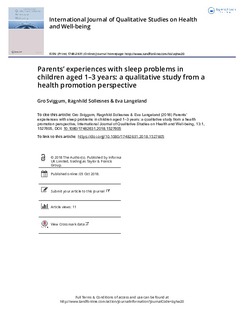Parents' experiences with sleep problems in children aged 1-3 years: a qualitative study from a health promotion perspective
Journal article, Peer reviewed
Published version
Permanent lenke
http://hdl.handle.net/11250/2583288Utgivelsesdato
2018Metadata
Vis full innførselSamlinger
- Import fra CRIStin [3580]
- Institutt for helse- og omsorgsvitskap [2721]
Originalversjon
Sviggum, G., Sollesnes, R. & Langeland, E. (2018). Parents’ experiences with sleep problems in children aged 1–3 years: A qualitative study from a health promotion perspective. International Journal of Qualitative Studies on Health and Well-being, 13(1), 1-9. 10.1080/17482631.2018.1527605Sammendrag
Purpose: The aim of this study was to explore the experiences of parents whose children aged 1–3 years have sleep problems, from a health promotion perspective.
Methods: This was a qualitative study, based on semi-structured interviews with 12 mothers in Norway. The material was analysed by qualitative content analysis. Results: Parents experienced problems with getting their children to bed, getting them to fall asleep, and episodes of awakening at night. Parents expressed that it was time-consuming and difficult to teach their children sleep regulation. Parents handled the sleep problems through the following coping strategies: acknowledging challenges, clarifying one’s selfunderstanding, implementing change measures, and safeguarding family well-being. These coping strategies resulted in this main theme: the health-promoting regulation of interactions, including parents’ strengthening of sleep regulation in their small children and the safeguarding of well-being in the family.
Conclusions: Early, individually customized guidance for parents, with a focus on revealing and acknowledging their experiences with sleep problems in children, is essential for parents to find opportunities to cope with such challenges. Appropriate goals seem to be important for them to succeed in strengthening sleep regulation in their children in a more satisfactory way.

